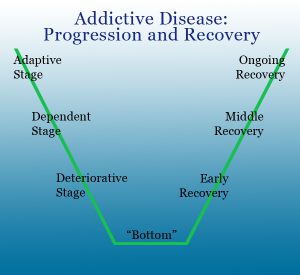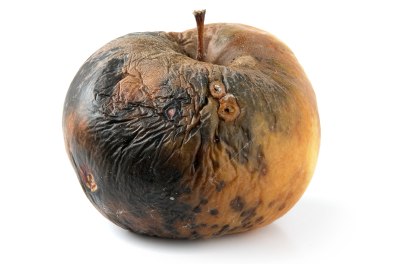Warning: Undefined variable $serie in /home/domains/treatmentandrecoverysystems.com/docs/wp-content/plugins/wp-series-manager/wp-series-manager.php on line 264
Nonbelievers often get put on the defensive early in our society- Western culture has a pretty strong bias in Judeo-Christian ideology. A lifetime of maintaining different (and unpopular) belief can build an outlook that can be characterized as “tenacious” or “stubborn” depending on your viewpoint. It becomes easy for this determined skepticism to color many issues, even when it creates problems- such as in dealing with the disease of addiction. Doesn’t help that so much of the available treatment and recovery support leans heavily on theistic language and presumes an orientation of belief.
But addicts and alcoholics follow a fairly predictable route from drinking/using to stable abstinence and recovery, whether they believe in god or not.
 The Adaptive Stage of use is characterized by euphoria, lack of apparent problems or consequences, increasing tolerance, the “good times” that get stamped deeply into the brain. It ends as the user begins to experience difficulties enjoying things without the substance, and starts feeling irritability, anxiety, and defensiveness about their use.
The Adaptive Stage of use is characterized by euphoria, lack of apparent problems or consequences, increasing tolerance, the “good times” that get stamped deeply into the brain. It ends as the user begins to experience difficulties enjoying things without the substance, and starts feeling irritability, anxiety, and defensiveness about their use.
The Dependent Stage sees the beginning of loss of control, withdrawal symptoms, and the use of defense mechanisms to explain away the problems and consequences starting to manifest. Relationships suffer, thinking distorts, and reality becomes skewed.
In the Deteriorative Stage, there are overt conflicts about increasingly-serious substance-related consequences and problems, unpredictable behavior, personality distortion (“Jekyll/Hyde”) and more severe health effects. When the pain reaches the point of unbearability, the user/addict begins to consider the unthinkable: Trying to quit.
Early Recovery is characterized by seeking or accepting help, sometimes to alleviate a crisis. It includes detoxification, and the physical problems of adjustment to not using or drinking, including extreme mood swings, ambivalence about recovery, and denial or resistance to the demands of treatment and recovery.
During Middle Recovery, the addict or alcoholic learns about their disease and begins to take responsibility for their recovery. Although still anxious about the possibility of relapse, they may begin to repair relationships, and build new, supportive relationships with peers in recovery.
Ongoing Recovery is characterized by a commitment to sobriety, appreciation for the benefits of recovery and a diligent use of the tools that help maintain a sober life, from helping others recover to building healthy habits, relationships, and practices.
By understanding the basic coordinates on this “recovery map,” non-believers can also identify and adapt (or at least put aside a natural resistance to) many of the tools needed for recovery. These ten “milestones” represent key experiences for building recovery:
- Seeking help: The starting place on the journey back to sanity is difficult for several reasons: Addicts are mistrustful and naturally resistant to help. They often have a (misplaced, where addiction is concerned) belief in willpower, and they love to procrastinate.
- Stop drinking/using: This is often mistaken for the goal or end point of recovery, but in fact it’s the beginning. Safely detoxing can be a tricky process and ‘going cold turkey’ isn’t always a good idea. Medical supervision can prevent a whole range of problems.
- Joining a self-help group: Seeking out others who have achieved recovery can be a literal lifesaver. Finding the best type of group for a particular person might take some experimentation, but all share a common focus- helping members to not drink/use drugs.
- Learning about your disease: Like a heart patient or diabetic, an addict or alcoholic must learn to identify problems and symptoms that signal relapse, and manage many facets of day-to-day health practice to maintain their recovery.
- Seeing the ‘biogenic’ view: Seeing beyond the many and varied ‘psychogenic’ explanations/interventions associated with addictive disease connects the necessary practices of recovery to the basic physiology of the disease.
- Self-diagnosis: It’s one thing to understand the nature of addiction and the requirements of recovery, and another to apply it to one’s self. Identifying this disease as the source of their problem helps the alcoholic internalize the motivation to do what it takes to recover.
- Learn to live “one day at a time”: Sounds easy, might be the hardest task of recovery. The past and the future are endless sources of excuses, stress, anxiety, fantasy, and other recovery-destroyers. Changing behavior today, on the other hand, is the key to success.
- Rebuild life around recovery: The addiction becomes the central organizing principle of the addict’s life. To replace it, recovery must become the central organizing principle. Socializing, working, spending leisure time, all need to contribute positively to staying sober.
- Meet challenges by staying sober: Addiction conditions the response to challenge: Job loss, relationship difficulties, financial trouble, become excuses for another binge. Changing that response to meet the challenge without drinking/using is a big recovery milestone.
- Tell key people about your recovery: Shame, stigma, and “they can’t possibly understand” promote isolation. Communication helps build support and understanding for recovery, and opens the door to being able to help others in need of recovery support.
Although the natural terrain of the “Recovery Map” remains the same for believer and non-believer alike, much of the superstructure is shaped or colored by our culture’s bias in favor of theist belief. In future articles, we’ll explore some of these coordinates in more detail in hopes of helping the non-believer find useful resources, adapt available tools to their needs and chart their own course to recovery.
These are posts belonging to the same serie:
- Recovery Without God
- Taking Charge by Having Faith
- Atheology for Recovery
- The Church of the Exalted Chemical
- Finding a Skeptical Starting Point
- Re-Engineering Recovery Tools
- Nonbelievers Moral Inventory
- Taking the Fifth
- The Readiness is All
- Humility Ain't for Wimps
- The Damage Assessment
- Do-It-Yourself Repairs
- Good Practice Over Bad Habit
- Balancing Act














Lisa, you’re more than welcome to copy & paste or print out the page, whatever works for you. When we have the “Recovery Without God” series finished (it’s looking like about a dozen or so articles, at this point) we’ll probably put it all together as a .pdf. But no point in waiting that long if you can find a use for it today!
This post is jam-packed with good information. Do you have a PDF with copyright on it? If not, I would love to make a copy of this with your permission.
Most importantly it got me thinking about how I approach (scary/unfamiliar) tasks. My favorite line. “… consider the unthinkable …” For me, every time I am embarking on a new adventure, I am one foot in the door and the other, “considering the unthinkable.”
Getting sober, in and of itself, has provided a template for every challenge I currently face.
As always, thank you. Lisa